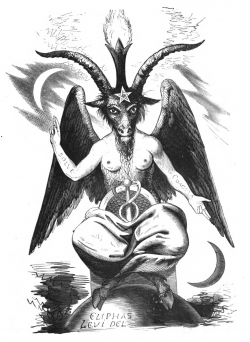- Sep 22, 2013
- 4,956
- 250
- 85
Satanism is a group of ideological and philosophical beliefs based on the character of Satan. Contemporary religious practice of Satanism began with the founding of the Church of Satan in 1966, although a few historical precedents exist. Prior to the public practice, Satanism existed primarily as an accusation by various Christian groups toward perceived ideological opponents, rather than a self-identity. Satanism, and the concept of Satan, has also been used by artists and entertainers for symbolic expression (source of information: Wikipedia).
Satan (or the 'Devil') is the adversary of God and hence the Christian epitome of temptation and corruption.
To Satanists, Satan is a 'father-figure' meant to bestow a feeling of metaphysical escape from the confines of a congested orthodox world. Satanists have been criticized for bizarre rituals and have even been accused of inhuman practices such as cannibalism and child-sacrifice.
I'm a follower of Catholic beliefs/rituals, and I find that intellectually entertaining notions about religious pluralism and free-speech regarding non-mainstream religions such as Satanism and Scientology represents a social investment in stimulating philosophical dialogue.
Even if Satanism seems unusual or bizarre to non-Satanists, we could motivate ourselves to ask questions such as, "Why is Satanism meaningful to its devotees?"
As long as a religion does not force its beliefs onto others through fascism (as Satanists and Christians have done alike!), we should respect the decision of its devotees to honor its philosophical assumptions.
Satanism seems to offer its members opportunities to meditate on the human consequences of rebellious imagination.
Satanism (Wikipedia)

Satan (or the 'Devil') is the adversary of God and hence the Christian epitome of temptation and corruption.
To Satanists, Satan is a 'father-figure' meant to bestow a feeling of metaphysical escape from the confines of a congested orthodox world. Satanists have been criticized for bizarre rituals and have even been accused of inhuman practices such as cannibalism and child-sacrifice.
I'm a follower of Catholic beliefs/rituals, and I find that intellectually entertaining notions about religious pluralism and free-speech regarding non-mainstream religions such as Satanism and Scientology represents a social investment in stimulating philosophical dialogue.
Even if Satanism seems unusual or bizarre to non-Satanists, we could motivate ourselves to ask questions such as, "Why is Satanism meaningful to its devotees?"
As long as a religion does not force its beliefs onto others through fascism (as Satanists and Christians have done alike!), we should respect the decision of its devotees to honor its philosophical assumptions.
Satanism seems to offer its members opportunities to meditate on the human consequences of rebellious imagination.
Satanism (Wikipedia)


